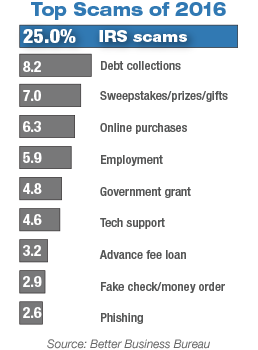February 2017
THIS MONTH: |
|
|
Action Items:
• Receive all 1099s and W-2s • Set up Tax Appointment • Rebalance Investment Portfolios |
|
|
February 14th
Valentines Day |
|
|
February 20th
Presidents Day |
|
As your mailbox fills up with information required to organize your 2016 tax records, now is the time to think about productive ways to use your potential refund. Outlined here are some ideas to consider. Unfortunately, tax-filing season is also tax-scam season. This month’s newsletter shows you how to identify possible fraudsters that may target you. Information regarding the pending overtime law change rounds out this month’s newsletter.
Reminder: It is Tax Scam Season Too
Imagine you receive a call from an IRS agent who says you owe back taxes and threatens to arrest you if you don’t immediately make a payment over the phone.
Thousands of Americans faced this situation in 2016, though the people on the other end of their phone lines weren’t actually from the IRS. They were scam artists calling across the world from Mumbai, India. Their aggressive intimidation of U.S. taxpayers brought in $150,000 a day until police cracked down on their call center.
Amazingly, con artists impersonating IRS agents were involved in a quarter of all the consumer fraud incidents reported to the Better Business Bureau last year, making it by far the most common financial scam. With the new tax-filing season underway, now is the time to be especially vigilant.
The threatening approach used in Mumbai is just one variety of IRS scam. Another involved sending emails from fake IRS addresses telling taxpayers that due to a mistake they were owed larger refunds. According to the email, all they had to do was provide their bank information and prepay the tax due on the larger refund. Once they made the prepayment, both the scammer and their supposed refund disappeared.
See through any IRS scam
By following a few guidelines you can see through any IRS scam:
 Digital communication is a big no. The IRS will never initiate contact with you via email, text message or social media, nor will they request personal or financial information over those channels. If you do get an email communication purporting to be from the IRS don’t click on any links or open any attachments. Instead, forward the email to phishing@irs.gov.
Digital communication is a big no. The IRS will never initiate contact with you via email, text message or social media, nor will they request personal or financial information over those channels. If you do get an email communication purporting to be from the IRS don’t click on any links or open any attachments. Instead, forward the email to phishing@irs.gov.
Mail first. The first contact from the real IRS will be through the mail. If you get a letter from the IRS that is unexpected or suspicious, it should have a form or notice number searchable on the IRS website, www.irs.gov. Compare what you find there with what you received. If it doesn’t look right, you can call the IRS help desk at 1-800-829-1040 to question it.
Never pay by phone. A legitimate IRS agent will never make a call to demand immediate payment of a bill or ask you to provide your debit or credit card information over the phone. If you are suspicious, ask for the employee’s name, badge number and phone number. A real IRS agent won’t hesitate to provide this information. You can then politely end the call and dial the IRS at 1-800-366-4484 to confirm the person’s identity.
Overtime Rules Go Into Overtime
What you need to know
 The fate of a Labor Department rule extending mandatory overtime pay to workers by doubling the eligible salary cap is uncertain under the new presidential administration.
The fate of a Labor Department rule extending mandatory overtime pay to workers by doubling the eligible salary cap is uncertain under the new presidential administration.
The rule introduced by the Labor Department under the direction of former President Barack Obama increases the salary cap for workers eligible to receive mandatory overtime to $47,476. It extends mandatory overtime, or time-and-a-half pay, to workers primarily in managerial or administrative roles in the retail, restaurant, and nonprofit industries.
Opponents of the rule won a court injunction blocking it in November 2016. The case may be abandoned altogether depending on the priorities set by President Donald Trump’s appointee to lead the Labor Department. Andrew Puzder, chief executive of fast food corporation CKE Restaurants Holdings Inc. (owner of Hardee’s and Carl’s Jr.) is undergoing Senate confirmation for the role. Until the case is resolved, the previous salary cap of $23,660 remains in place.
Use Your Tax Refund Wisely

Three of every four Americans got a refund check last year and the average amount was $2,777, according to IRS statistics. Because the amount of a refund is often uncertain, we may be tempted to spend it without too much planning. One way to counteract this natural tendency is to come up with a plan beforehand to spend your refund purposefully. Here are some ideas:
- Pay off debt. If you have debt other than your home mortgage, a great spending priority can be to reduce or eliminate it. The longer you hold debt, the more the cumulative interest burden weighs on your future plans. You have to work harder for longer just to counteract the effect of the debt on your financial health. Start by paying down debts with the highest interest rates and work your way down the list until you bring your debt burden down to a manageable level.
- Save for retirement. Saving for retirement works like debt, but in reverse. The longer you set aside money for retirement, the more time you give the power of compound earnings to work for you. This money can even continue working for you long after you retire. Consider depositing some or all of your refund check into a Traditional or Roth IRA. You can contribute a total of $5,500 to an IRA every year, or $6,500 if you’re 50 years old or older.
- Save for a home. Home ownership is a source of wealth and stability for many Americans. If you don’t own a home yet, consider building up a down payment fund using some of your refund. If you already own a home, consider using your refund to start paying your mortgage off early.
- Invest in yourself. Sometimes the best investment isn’t financial, but personal. If there’s a course of study or conference that would improve your skills or knowledge, that could be a wise use of your money in the long run.
- Give some of it away. Helping people, and being able to deduct gifts and charity from your next tax return, isn’t the only benefit of giving to a good cause. Research shows that it makes us feel good on a neurological level. In fact, donating money activates our brains’ pleasure centers more than receiving the equivalent amount.1
If a refund is in your future, start planning now on how it can best help your financial situation.







